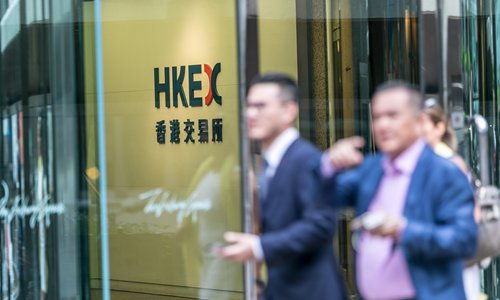HOME >> BUSINESS
HKEX offer ‘late’ but efforts will continue, says chief executive
Source:Global Times Published: 2019/9/22 22:18:40

Pedestrians pass by the office of HKEX in Hong Kong. File photo: VCG
It is normal that the London Stock Exchange (LSE) rejected a proposed acquisition by the Hong Kong Stock Exchange (HKEX), said HKEX Chief Executive Charles Li Xiaojia, adding that the bourse will continue its efforts.
One expert suggested on Sunday that the HKEX should encourage more IPOs from companies based in the Chinese mainland and the participation of offshore capital to enhance its role as a free market.
"What has happened is very normal in international merger and acquisition deals, and the feedback [from the LSE] has been normal," Li said in an interview on Saturday during the 4th China BioMed Innovation and Investment Conference held in Suzhou, East China's Jiangsu Province, reported thepaper.cn.
Li stressed that the merger would generate huge strategic effects. "But that does not mean that people are willing to make this happen today," he said.
He also said that the HKSE's bid was a little late. "We will continue our efforts in this direction," he said.
The HKSE made a 32 billion pound ($40 billion) bid to take over the LSE. In a statement published on the HKEX's website on September 11, Li said that the proposal is "ambitious, far-reaching and could have a transformative effect on global financial markets."
The LSE rejected the acquisition offer with a public statement on September 13.
In the statement, it expressed concerns about "key aspects" of the proposal and said it "sees no merit in further engagement."
The LSE also noted that it continues to make good progress on its proposed acquisition of financial data analytics provider Refinitiv Holdings.
According to the LSE, it recognizes the scale of opportunities in the Chinese mainland but doesn't believe the HKSE will provide the best listing platform for the mainland.
The Shanghai-London stock connect program started in June.
Dong Dengxin, director of the Financial Securities Institute at the Wuhan University of Science and Technology, said that the LSE might not be psychologically prepared to be taken over by an overseas stock exchange, but the interconnection of resources between London and Hong Kong stock exchanges will be much smoother compared with the cooperation between the London and mainland stock exchanges because the mainland capital markets still lag behind in terms of market freedom.
"Despite the rejection from London, I think the HKSE will continue to make such acquisition proposals in the future and it might still happen in the end, particularly with the exchange's unique advantages in its large number of overseas institutional investors," Dong said.
He suggested that to increase international competence, the HKSE should strengthen the A+H listing mechanism to encourage IPOs by mainland companies, while strengthening its role as a free capital market.
Posted in: COMPANIES